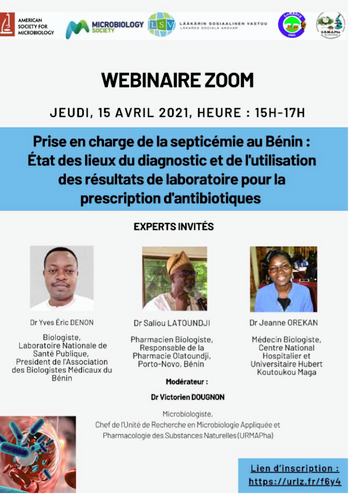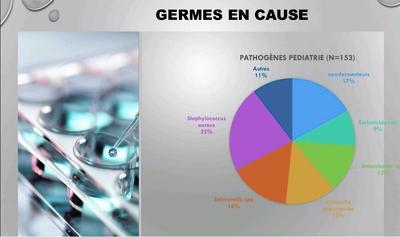Sepsis in Benin: diagnosis and management

The webinar was titled ‘Management of sepsis in Benin: state of the art of diagnosis and use of laboratory results for antibiotic prescription’ and explored the diagnosis and management of sepsis in Benin. Sepsis is a serious public health problem and without treatment, is fatal in 40 to 50% of cases. The Global Sepsis Alliance reports that more than 3.4 million people contract sepsis each year in Europe alone, with approximately 700,000 deaths. In low- and middle-income countries, lack of health coverage, hygiene problems and other factors handicap the management of sepsis. The management of sepsis can be seriously hampered when the bacteria involved are resistant to antibiotics. In Benin, few data are available on the diagnosis and management of sepsis. All this motivated the organisation of this webinar.
Three experts shared their knowledge
The diagnosis and management of sepsis involves three main actors:
- The physicians, who receive the patients, make the diagnosis, prescribe analysis and then antibiotics on the basis of the laboratory results
- The biologists, who perform the blood culture and antibiotic susceptibility tests
- The pharmacists, who give antibiotics on the basis of a prescription produced by the physician.
To optimise the debate, one of each of these three professionals were involved in the discussion. They were Dr Yves Eric Denon, biologist and President of the Association of Medical Biologists of Benin; Dr Denon is also a member of the staff of the National Public Health Laboratory in Benin. Also presenting were Dr Saliou Latoundji, a pharmacist in charge of the Olatoundji Pharmacy in Benin and Dr Jeanne Orekan, medical biologist, at the Bacteriology Laboratory of the Hubert Koutoukou Maga National Hospital and University Center.
The webinar was moderated by myself and Dr Brice Boris Legba, researcher in ricrobiology at the Research Unit in Applied Microbiology and Pharmacology of natural substances, University of Abomey-Calavi.
Instructive presentations and constructive exchanges
The session started with the communication of Dr Jeanne Orekan with her talk titled ‘Challenges related to the management of sepsis in Benin’. In this presentation, Dr Orekan presented the concepts related to sepsis, before highlighting the problem of antimicrobial resistance which creates difficulties in the management of the disease. Her presentation ended by discussing the different challenges related to the diagnosis and management of sepsis in Benin. Among these challenges was the problem of high costs associated with blood cultures in Benin, contamination of blood cultures – with one in ten contaminated in Benin – and the high cost of antibiotics which does not allow the population to take care of itself.

The second presentation, by Dr Yves Eric Denon focused on the theme ‘Sepsis: germs involved’. The biologist detailed the biological diagnosis of the blood culture, the optimal conditions of sampling and analysis and the germs often involved in sepsis. He also presented some results of works showing the resistance of several bacterial strains isolated from blood cultures in Benin. For him, optimising the management of sepsis should include the fight against antimicrobial resistance.
The last communication was that of pharmacist Saliou Latoundji, who went into detail on the most prescribed antimicrobials to treat sepsis, the conditions of delivery of antibiotics and many other aspects. Following these communications, an enriching debate took place including comments, contributions and questions.
Interesting perspectives for improving the diagnosis and management of sepsis in Benin
One of the main features of this webinar was its inclusive nature, bringing together perspectives of health professionals from different backgrounds on the issue of sepsis. The participants pledged to work together to improve the diagnosis and management of sepsis in Benin. It is necessary to strengthen the skills of laboratory technicians in the conduct of blood culture and antibiogram. Awareness-raising campaigns should also be conducted to combat self-medication and to improve the use of laboratory results relating to antibiotic susceptibility testing, and blood cultures by doctors when prescribing antibiotics. Some initiatives which are already in place in the country will certainly help to address these challenges.
PSR-Finland and the Non-Governmental Organisation "Centre de Réflexions et d'Actions pour le Développement Intégré et la Solidarité (CeRADIS-ONG) and the University of Abomey-Calavi have launched a capacity building project "Quality laboratory testing -training project in Benin 2021–2022". This project aims to strengthen medical laboratories in Benin, with a focus on antimicrobial resistance testing and detection of resistant bacteria that cause life-threatening bloodstream infections, including sepsis.
